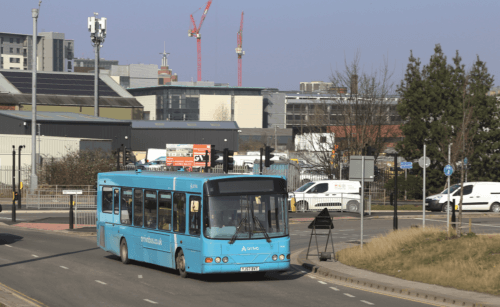Liverpool Mayor Joanne Anderson has accused Arriva of pushing staff into poverty as the local drivers’ strike continued. Meanwhile, the long-running strike action in the firm’s West Yorkshire division has ended.
The Mayor of Liverpool said the pay offer was ‘pitiful’ and urged bosses to end the continuing strike action affecting the region, where Arriva is just one of the operators across the UK which has been affected by industrial disputes as the industry attempts to rebuild following the pandemic.
Arriva workers, represented by the Unite and GMB unions, resorted to strike action as a result of an ongoing pay dispute, with walk-outs set to continue on the same day as the national rail strike took place, reported the Liverpool Echo. Arriva said it believes the 8.5% pay increase it has offered is generous, but the unions rejected this and said the issues over pay and conditions have ‘fermented’ over many years.
In a letter to Mike Cooper, the CEO of Arriva, the Mayor wrote: “Currently, the majority of our residents are facing a cost-of-living crisis that means without decent pay, they will fall sharply into in-work poverty. Your workforce is also facing this tsunami of rising costs and you must take some responsibility for their well-being.
“We know that Arriva can afford a fair rate of pay. Arriva’s parent company DB Group saw revenue rise by 18.4% in 2021 to 47.5 billion Euros. Arriva is making it very clear that they are choosing to prioritise profits over supporting their hard-working workforce that connect our communities.”
A spokesperson for Arriva told the newspaper: “We value our people and are greatly concerned by the rising cost of living and that’s why we moved decisively to offer a generous pay increase of 8.5% for bus drivers – a pay rise that very few employers in the public or private sector are matching.
“The offer would see Arriva bus drivers in Merseyside receive the highest rate of any major bus company in the North West. It has been put forward despite passenger numbers below pre-pandemic levels and operating costs increasing across the board, such as fuel.
“While we strongly believe bus workers deserve a pay rise, quite simply any pay increases must be affordable to protect fares and networks. Strike action makes it even harder to fund increased pay, as well as harming the communities that rely on essential services.
“We apologise to customers that are inconvenienced by these strikes. We want to work in partnership with our trade unions to solve shared challenges together and we urge our trade union colleagues to call off this strike and join us in talks. We would welcome including ACAS to support this process.”
Meanwhile, the long-running strike by Arriva workers across parts of Yorkshire ended after a new pay deal was agreed. Around 650 drivers took to the picket lines after rejecting an initial 4% offer in the industrial action which began on 6 June and was called off after Arriva and the Unite union struck a deal. What Unite called a ‘vastly improved’ offer worth around 9% was accepted following a ballot of members, the union said.
Unite General Secretary Sharon Graham called it a ‘superb result for our members,’ adding: “Through their unity and determination they have ensured Arriva more than doubled its original offer.”
Arriva said it was pleased for its customers and colleagues that an agreement had been reached, and praised the Mayor of West Yorkshire, Tracy Brabin, for her support in discussions between the parties.


